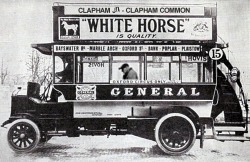 “The best argument against democracy is a five-minute conversation with the average voter.”
“The best argument against democracy is a five-minute conversation with the average voter.”
–Sir Winston Churchill
The hills may be alive with the sound of music, but the UK medical blogosphere is alive with the sound of rebellion. Virtually all British medical bloggers – and much superb research and writing has been and is being done – are singing off the same hymn sheet: Broken Arrow’s NHS reforms will be at best disastrous, at worst will kill off the NHS.
The Royal College of Nursing has come out staunchly against the reforms; while the British Medical Association has been, to its shame, woefully timid, but is nonetheless critical of the proposals. And of course we have the wonderful Professor Allyson Pollock, the thinking doctor’s crumpet, writing sterling material in the medical journals and elsewhere.
Few can doubt that there is indeed a vast groundswell of professional opinion against the reforms, but there is also a problem: we are singing at each other, in the same room. Like a members of a Gospel choir, it may make us feel better, but the message isn’t getting out.
Indeed, if Dr No’s recent straw poll amongst well read intelligent lay people is anything to go by, even brighter patients – and we all become patients sooner or later – on the Clapham omnibus either haven’t got a clue about the reforms, or if they have, it is couched in the simplest terms: better my GP commissions my healthcare than a faceless PCT bureaucrat; or GP commissioning sounds more ‘local’, and ‘local’ is always better. All very tea and biscuits, all very Dr Finlay, with nice Dr Cameron arranging nice Janet’s nice hip operation at the nice local hospital; and what could possibly be nicer that that?
Meanwhile, even as he announced the ‘listening exercise’, the Secretary of State, Andrew Lansley, gloated that eighty-seven percent of GPs, covering forty-five million patients, have already signed up to commissioning consortia – and if that wasn’t a ringing endorsement, then what was – while his sycophantic back benchers fibbed about how devoted GPs were to the reforms, and implored their darling Secretary of State to give assurance that he would not to go back on his word.
This divergence between professional assessment of the implications of the reforms, and lay and political understanding of those implications, is as striking as it is wide; and it arises, Dr No suspects, for two related reasons. The first is that the Health and Social Care Bill, which contains the reforms, is over-long, over-complex and so an excellent stealth vehicle for hiding its own intentions, and the second, which no doubt arises in part because of the first, is the media’s habit – with the BBC leading the way – of covering the reforms not with health correspondents, but with political correspondents – Nick Robinson springs to mind, and political correspondents report political news. Indeed, Robinson is even on record dismissing health related material as ‘too technical’, the better to get coverage back to the easy ground of political squabbles, coalition crashes, and Cable clips.
The net effect of the media’s reluctance to delve into a complex Bill, an over-reliance on political correspondents, combined the necessarily complex and detailed and so inevitably less accessible professional assessments of the consequences of the Bill is that those consequences get lost. Our patient on the Clapham Omnibus remains either ignorant, or ill-informed – or both.
Ignorant and/or ill-informed voters further compromise even the best intentioned democracy. Perhaps it is time we medical bloggers found a way to sing to a wider audience.
